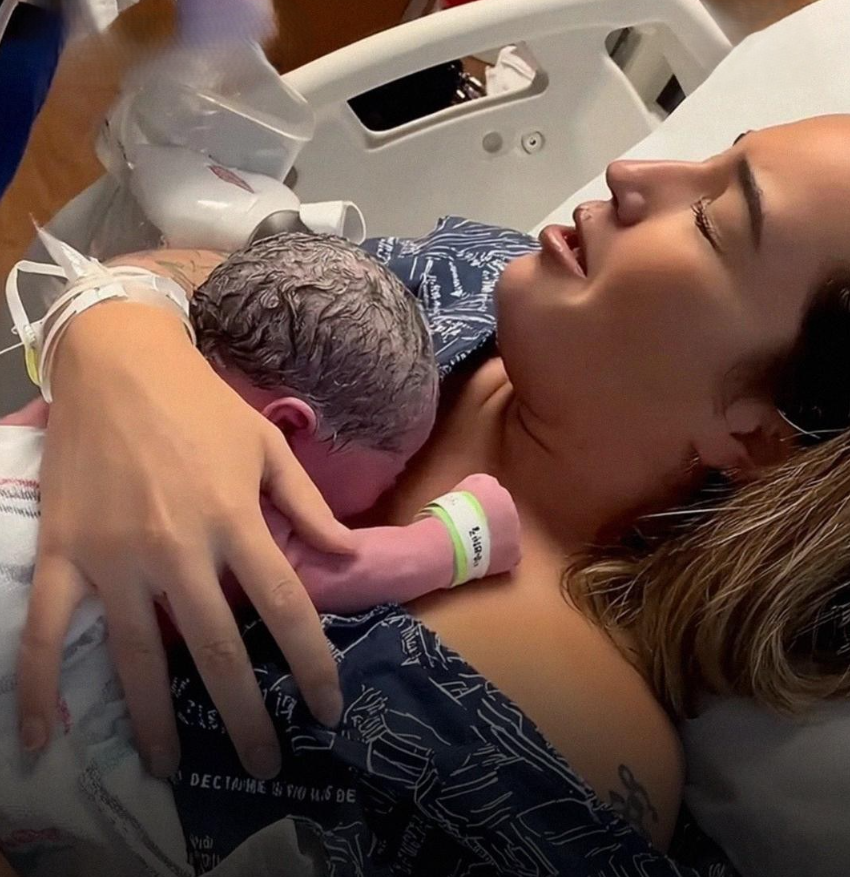Six hours into labor, I gripped Dave’s hand like a lifeline, breathing through pain that felt like my bones were being pried open. Then his phone buzzed. He glanced down, and I saw the name flash on the screen—Mom.
He froze, stepped into the hallway, and returned, twitchy, eyes darting everywhere but at me.
“What’s wrong?” I asked, my voice thin between contractions.
“I need to go. I’ll be quick.”
I thought he was joking. “Dave, no. I’m in labor. You can’t leave.”
“It’s my mom,” he said. “She needs help.”
“For what?”
He kissed my forehead and bolted before I could say another word.
A minute later, my phone buzzed.
“I’ll be back soon. Mom just needs help.”
“Is she okay?”
“She’s fine. Groceries are heavy.”
I stared at the screen, disbelief curdling into rage. The nurse noticed the monitor spike. “Honey, what happened?”
“My husband left,” I said, my voice shaking. “For his mother’s groceries.”
Her mouth tightened. “You just focus on you, sweetheart. We’ve got you.”
I called my dad. He didn’t hesitate. Twenty minutes later, he burst into the delivery room, smelling of fried chicken and aftershave. His presence grounded me instantly.
“Where’s that man of yours?” he asked.
“Helping his mom,” I said bitterly.
Dad exhaled hard. “Then I’ll be here.”
The nurse—Gloria—grabbed my hand and told an intern to record the birth since Dave had the camera. Between her calm voice and my father’s steady grip, I pushed through the storm alone. When my daughter finally arrived, the world went silent except for her first cry.
We named her Gabrielle. Gabi.
Gloria placed her on my chest, and I felt everything—relief, fury, heartbreak, love—crash together. My dad brushed my hair back. “He’ll regret this one,” he said softly. “But right now, it’s just you and Gabi.”
By discharge, I had made my decision. I wasn’t going home with Dave. Dad drove us to his house, the baby sleeping in her car seat beside me. Before we left, I saved the birth video on a flash drive and wrote Dave a letter. I gave both to Gloria to hand over if he showed up.
This is what you missed. The moment your daughter took her first breath. The moment I needed you most. Watch this and ask yourself if you understand what being a husband and father means. Because right now, you don’t.
He showed up at the hospital hours too late. We were gone. He texted and called. I didn’t answer.
Three days later, we had a small family gathering at Dad’s place to introduce Gabi. I didn’t invite Dave, but he showed up anyway—eyes bloodshot, holding flowers that looked like guilt wrapped in paper.
“Please,” he said from the porch. “Let me explain.”
I stepped outside, closing the door behind me. “Explain how groceries outranked your wife in labor?”
He winced. “She called panicking. I thought it was serious. I didn’t want to ignore her—”
“You left your laboring wife to carry your mother’s groceries, Dave. You made a choice.”
“I know,” he said, voice cracking. “I was stupid. I thought I could do both. I thought I’d be back in time. I wasn’t thinking straight. Please, let me make it right.”
I held Gabi tighter, her small chest rising against mine. “You get one chance,” I said. “Not with words. With actions. You show up, every single day, or you don’t show up at all.”
He nodded, desperate. “I will. I swear I will.”
And to his credit—he did start trying.
He showed up at midnight feedings. Changed diapers without being asked. Went to every pediatric appointment. Did dishes, laundry, and grocery runs without complaining. He looked at me differently too—not with the smug comfort of a man who assumes forgiveness is automatic, but with the careful humility of someone trying to earn it.
Still, I kept my distance emotionally. I wasn’t ready to forget what it felt like to look around that delivery room and realize the one person who promised to stand beside me had walked out.
When Gabi turned a month old, I let him come over for dinner. He rocked her gently while I cleaned bottles, whispering apologies to her like prayers.
“I’ll never miss another moment,” he said.
“I hope not,” I told him. “Because there won’t be another chance to prove it.”
He nodded, eyes wet. I think, for the first time, he actually understood.
As for his mother—she never called. Never apologized. Not for the phone call that pulled him away, not for the chaos it caused. I used to wait for her to acknowledge it, but I’ve stopped expecting accountability from people who confuse dependence with love.
That day taught me more than any self-help book ever could. Love isn’t about convenience. It’s about presence—about showing up when it’s hardest, when it’s inconvenient, when you’re terrified or exhausted or torn between loyalty and courage.
Dave failed that test once. Whether he passes the next one is still up to him.
In the meantime, I’ve built my peace around people who don’t need reminders to stand beside me. My dad. Gloria, who held my hand when my husband didn’t. And Gabi—the little human who taught me that strength doesn’t always roar; sometimes it just breathes, quietly, in your arms.
If I could go back to that moment—the contraction, the phone ringing, the panic—I’d tell my past self one thing: you’re stronger than the person who left, and kinder than the one who made excuses.
Because real family isn’t built on promises. It’s built on showing up.
